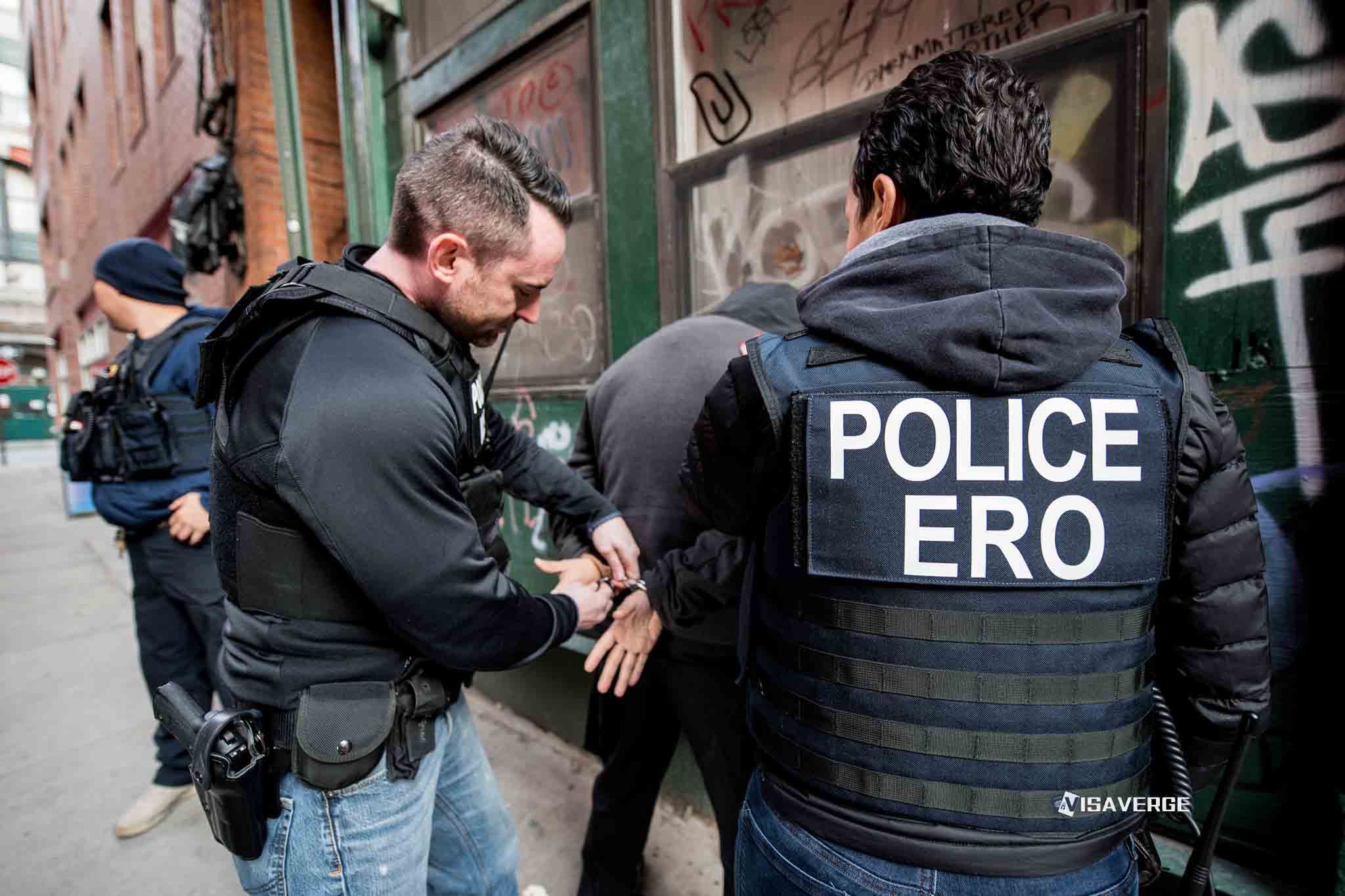Key Takeaways
• Florida AG filed to dismiss lawsuit challenging local police 287(g) immigration enforcement agreements on May 27, 2025.
• SB 4-C criminalizes undocumented presence; lawsuit claims it violates federal authority and constitutional rights.
• Governor DeSantis expanded 287(g) agreements with five state agencies for enhanced immigration law enforcement.
On May 27, 2025, Florida’s Attorney General asked a federal court to throw out a lawsuit that challenges the state’s push for city and local police to help enforce federal immigration laws. This legal fight centers on Florida’s requirement that local law enforcement agencies sign agreements with U.S. Immigration and Customs Enforcement (ICE) under the 287(g) program. These agreements let local officers act like federal immigration agents in some situations. The lawsuit, brought by immigrant rights groups, argues that Florida’s approach is unconstitutional and puts immigrant families at risk. The outcome of this case could shape how immigration laws are enforced in Florida and possibly across the United States 🇺🇸.
What Is the 287(g) Program and Why Is Florida Using It?

The 287(g) program is a partnership between ICE and local or state law enforcement agencies. When an agency signs a 287(g) agreement, some of its officers get special training from ICE. After this training, these officers can:
- Question people about their immigration status
- Detain and process people they suspect are in the country without permission
- Serve immigration warrants
- Prepare paperwork for ICE to review
The goal, according to state officials, is to help ICE find and deport people who are in the United States 🇺🇸 without legal status. Governor Ron DeSantis has said that expanding the 287(g) program will make Florida safer by allowing more officers to help remove people who are in the country illegally.
How Did This Lawsuit Start?
The lawsuit was filed on April 2, 2025, by the Florida Immigrant Coalition, Farmworker Association of Florida, and several individuals. They are represented by the ACLU of Florida, Americans for Immigrant Justice, and the Community Justice Project. The lawsuit challenges both the state’s new law, SB 4-C, and the requirement that local agencies sign 287(g) agreements.
SB 4-C, signed into law in early 2025, makes it a crime for certain undocumented immigrants to be in Florida and requires police to hold them in jail before trial. The lawsuit argues that these policies:
- Take away the federal government’s exclusive power over immigration
- Put immigrants at risk of being detained or deported, even if they have no criminal record
- Violate constitutional rights, such as due process and equal protection
On April 4, 2025, a federal judge temporarily blocked SB 4-C from being enforced. Later, on April 29, 2025, the court extended this block, saying the law is likely unconstitutional. Florida has appealed these decisions, and the legal fight continues.
Florida’s Motion to Dismiss: What’s at Stake?
On May 27, 2025, Florida’s Attorney General filed a motion to dismiss the lawsuit. The state argues that:
- The lawsuit has no legal basis
- The 287(g) agreements are allowed under federal law
- The state has the right to require local agencies to help enforce immigration laws
The court has not yet decided whether to dismiss the case. If the court agrees with Florida, the lawsuit will end, and the state’s policies will stay in place. If the court lets the lawsuit go forward, there could be a trial to decide if Florida’s actions are legal.
Who Are the Key Players?
Governor Ron DeSantis: He has made immigration enforcement a top priority. In February 2025, he announced new 287(g) agreements with several state agencies, including the Florida Department of Law Enforcement (FDLE), Florida Fish and Wildlife Conservation Commission (FWC), Florida State Guard, Florida Highway Patrol, and the Department of Agricultural Law Enforcement. He said, “By allowing our state agents and law enforcement officers to be trained and approved by ICE, Florida will now have more enforcement personnel deputized to assist federal partners. That means deportations can be carried out more efficiently, making our communities safer as illegal aliens are removed.”
Attorney General: The state’s top lawyer filed the motion to dismiss, defending the agreements as legal and necessary for public safety.
Plaintiffs and Advocates: The ACLU of Florida, Americans for Immigrant Justice, and the Community Justice Project represent the groups and individuals challenging the law. Bacardi Jackson, Executive Director of the ACLU of Florida, called the law “unconstitutional and dangerous,” saying it takes away federal power and puts immigrant families at risk. Paul R. Chavez, Litigation Director at Americans for Immigrant Justice, warned that the law could lead to the detention of people who pose no threat and the denial of civil rights protections.
How Does the 287(g) Program Work in Practice?
Here’s a step-by-step look at how a 287(g) agreement is put into action:
- Memorandum of Agreement: A state or local law enforcement agency signs a formal agreement with ICE. This document spells out what the agency and ICE will do.
- Training: Selected officers get special training from ICE on immigration law and procedures.
- Delegation of Authority: ICE gives these trained officers the power to carry out certain immigration enforcement tasks.
- Operational Oversight: ICE supervises the work of these officers and reviews their actions.
- Enforcement Actions: Deputized officers can question, detain, and process people they suspect of being in the country without permission. They can also serve warrants and prepare documents for ICE.
You can read more about the 287(g) program and see which agencies participate on the official ICE 287(g) Program page.
Who Is Affected by These Policies?
Immigrant Communities: Florida has a large immigrant population. Immigrants make up about 38% of the construction workforce, 25% of service jobs, and between 37% and 47% of agricultural jobs. Many families include both U.S. citizens and undocumented members. The expansion of 287(g) agreements increases the risk that undocumented residents—even those with pending immigration applications or U.S. citizen family members—could be detained or deported.
Local Governments: Some local governments in Florida have pushed back against the state’s requirements, saying they want to set their own priorities and keep the trust of their communities. The state’s policy pressures these agencies to join the 287(g) program, even if they would rather focus on other issues.
Law Enforcement Officers: Officers who join the 287(g) program get extra training and new responsibilities. They can now question people about their immigration status and help ICE with deportations. Some officers and police leaders worry this could hurt their relationship with immigrant communities, making people less likely to report crimes or cooperate with police.
Business Community: Many Florida businesses rely on immigrant workers, especially in construction, hospitality, and agriculture. Business groups are concerned that aggressive immigration enforcement could lead to labor shortages and hurt the state’s economy.
What Are the Main Arguments on Each Side?
| Stakeholder | Position/Concern |
|---|---|
| Governor DeSantis/State Officials | Support expanded 287(g) agreements for public safety and efficient deportations |
| ACLU/Immigrant Advocates | Argue policies are unconstitutional, cruel, and risk wrongful detention |
| Local Governments | Some resist state mandates, citing local priorities and community trust |
| Business Community | Concerned about labor shortages and economic impact due to immigrant workforce disruptions |
| Immigrant Communities | Report increased fear, risk of family separation, and reluctance to engage with authorities |
Legal and Constitutional Issues
The lawsuit raises several important legal questions:
- Federal vs. State Power: The U.S. Constitution gives the federal government the main authority over immigration. The plaintiffs argue that Florida’s policies take away this power and create confusion.
- Due Process: The lawsuit says that forcing local officers to make complex immigration decisions can lead to mistakes, wrongful detentions, and violations of people’s rights.
- Civil Rights: Advocates warn that these policies could lead to racial profiling and discrimination against people who “look” or “sound” foreign, even if they are U.S. citizens or legal residents.
Recent Policy Changes and Expansion
Florida has steadily increased its involvement in immigration enforcement over the past several years. The passage of SB 4-C in 2025 marked a major step, making it a crime for certain undocumented immigrants to be in the state and requiring police to hold them in jail before trial. In February 2025, Governor DeSantis announced new 287(g) agreements with at least five major state law enforcement agencies, including:
- Florida Department of Law Enforcement (FDLE)
- Florida Fish and Wildlife Conservation Commission (FWC)
- Florida State Guard
- Florida Highway Patrol
- Department of Agricultural Law Enforcement
This expansion means more officers across the state can now help ICE enforce immigration laws.
What Happens Next?
The federal court has not yet ruled on Florida’s motion to dismiss the lawsuit. If the court allows the lawsuit to go forward, there could be a trial to decide if Florida’s policies are legal. If the court sides with the state, the lawsuit will end, and the 287(g) agreements and SB 4-C could stay in place.
Florida has already appealed earlier court decisions that blocked parts of SB 4-C, so the legal battle is likely to continue for some time. Lawmakers have also introduced bills, such as HB 1435, to try to roll back or change recent anti-immigrant policies, but it’s unclear if these efforts will succeed.
Broader National Context
Florida’s legal fight is part of a bigger national debate over how much power states have to enforce immigration laws. Similar legal battles are happening in Texas, Iowa, and Oklahoma. The outcome in Florida could influence what happens in other states.
Practical Guidance for Immigrants and Families
If you or someone you know is affected by these policies, here are some steps to consider:
- Know Your Rights: Everyone in the United States 🇺🇸 has certain rights, regardless of immigration status. You have the right to remain silent and to ask for a lawyer if questioned by police or ICE.
- Stay Informed: Follow updates from trusted organizations like the ACLU of Florida, Americans for Immigrant Justice, and the Florida Immigrant Coalition.
- Seek Legal Help: If you are detained or face deportation, contact a qualified immigration lawyer or one of the organizations listed below.
- Community Support: Many local groups offer support, information, and resources for immigrant families.
Where to Find More Information
- ICE 287(g) Program Overview (official government resource)
- ACLU of Florida
- Americans for Immigrant Justice
- Florida Immigrant Coalition
- VisaVerge.com provides ongoing analysis and updates on immigration policy changes and legal battles in Florida and across the United States 🇺🇸.
Conclusion: What’s at Stake for Florida and Beyond
Florida’s attempt to dismiss the lawsuit over city immigration enforcement agreement requirements is a major moment in the state’s ongoing push to play a bigger role in immigration enforcement. The outcome will affect not only state and local governments but also thousands of immigrant families, businesses, and communities across Florida. As reported by VisaVerge.com, the legal process is ongoing, and a court decision on the motion to dismiss is expected soon. Until then, the debate over the 287(g) program, SB 4-C, and the future of immigration enforcement in Florida remains heated and deeply personal for many people.
For those living and working in Florida, staying informed and knowing your rights is more important than ever. The next steps in this legal battle will shape the lives of immigrants, the work of law enforcement, and the future of immigration policy in the United States 🇺🇸.
Learn Today
287(g) Program → A federal-local partnership allowing trained officers to enforce immigration laws under ICE supervision.
SB 4-C → Florida state law criminalizing certain undocumented immigrants and requiring detention before trial.
Memorandum of Agreement → A formal contract between ICE and local agencies outlining immigration enforcement responsibilities.
Due Process → Legal principle ensuring fair treatment and judicial procedures before depriving rights.
Detention → Holding individuals in custody pending immigration proceedings or legal actions.
This Article in a Nutshell
Florida’s legal fight over 287(g) agreements raises constitutional questions amid expanded local immigration enforcement. Lawsuit challenges SB 4-C and state mandates, while court blocks parts as likely unconstitutional. Outcome shapes immigration enforcement policy, impacting immigrant communities, law enforcement, and local governments across Florida and beyond.
— By VisaVerge.com








